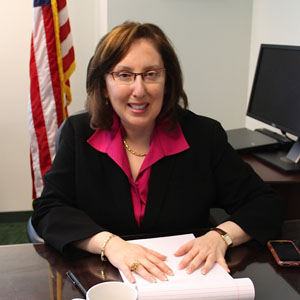People who know Deborah Jeffrey, the newly confirmed Inspector General at the Corporation for National and Community Service, call her a problem-solver: A clear, creative thinker with high ethical standards, with an uncanny ability to look past the extraneous stuff, identify the real problem and find collaborative ways to address it.
Richard Bozzelli met Jeffrey at Johns Hopkins University in 1978, where they lived in the same dorm complex, attended the same classes and majored in political science. Both went straight to Harvard Law School, where they shared a group of friends and each, in their final year, ran one of Harvard’s law journals.
 Some years later, it was only natural that Bozzelli turned to Jeffrey for advice when deciding whether to give up practicing law and enter seminary – even though he’s Catholic and she’s Jewish.
Some years later, it was only natural that Bozzelli turned to Jeffrey for advice when deciding whether to give up practicing law and enter seminary – even though he’s Catholic and she’s Jewish.
“Probably one of the defining features of Deb Jeffrey is her ability to cut through all of the noise and the mess, and hone in on what the issue is,” said Bozzelli, who now serves as a priest for the Archdiocese of Baltimore and credits Jeffrey for inspiring his interfaith outreach. “She’s very practical. She’s able to put you in a context that keeps you moving forward.”
That ability — to break down an issue into manageable parts, help others crystallize their perspectives and enable them to reach a solution – will be critical for Jeffrey in her new position heading up oversight of the country’s largest funder of service programs. Nominated by President Barack Obama last November to a post that had lain vacant since 2009, Jeffrey was confirmed as inspector-general of CNCS by the U.S. Senate on June 29. When she took her oath of office July 19, she left behind a 23-year career with the Washington, D.C., law firm Zuckerman Spaeder.
Youth Today recently sat down with Jeffrey to talk about the values she brings to her new watchdog job, the fallout from the steep budget cuts to her office last year, and her priorities ahead.
Engaging and forthright, Jeffrey acknowledged the corporation presents particular challenges for management because it is held accountable for funds that it does not directly control, such as sub-grants disbursed through state commissions. “You have an organization that is essentially in the business of giving away money,” she said.
At the same time, the large range of programs under the corporation’s jurisdiction vary dramatically in structure, depending on when they were created, Jeffrey said. “If you were starting from scratch, you would organize it in different ways. But we’ve inherited this structure,” she said. “It’s important that someone pulls back and says, ‘Is this working?’”
Jeffrey served 12 years on Washington, D.C.’s Board on Professional Responsibility, which hears disciplinary cases against attorneys and makes recommendations for action to the D.C. Court of Appeals. She resigned just before taking office. The experience strengthened her commitment to learning all the facts before making recommendations, she said.
“You can’t find out what happened in three easy questions,” Jeffrey said. “You have to dig. You have to be persistent in figuring things out. You have to know what questions to ask, and then you have to put it all back together in a way that makes sense.”
There’s a lot to figure out at CNCS. The corporation, which oversees huge programs like AmeriCorps, Senior Corps and Learn & Serve America, has been under increasing stress in recent years. Top leadership positions have gone unfilled for years. The House Appropriations Committee has tried for three consecutive years to eliminate funding for all programs except Senior Corps. And budget cuts have made it impossible to meet the ambitious goals set by the Edward Kennedy Serve America Act of 2009, a law intended to demonstrate President Barack Obama’s signature commitment to national service.
Among the milestones that have fallen by the wayside is the gradual expansion of AmeriCorps positions from 75,000 to 250,000 by 2017. Current numbers of AmeriCorps volunteers are at around 82,500, with about 1 million applicants turned away from participating in the program in the last two years.
The office of the Inspector General for the corporation has suffered as well. Last year, Congress slashed the watchdog office’s budget by half, to $4 million, leading to a written plea to Congress from acting Inspector-General Kenneth Bach, who ultimately had to let go of 19 out of 33 staff members and suspend all external audits for the year because of financial constraints.
“When you cut the personnel that drastically, there’s really nobody who can do the out-in-the-field work or supervise the outsourced audits,” Jeffrey said. “You lose a huge amount of knowledge.” The office does not even have clerical support anymore, because hiring a secretary would mean having to give up an investigative assistant, she said.
“If we magically had the budget back tomorrow, it will still take a lot of time to put the office back together,” Jeffrey said, adding that they’ve already lost out on promising applicants who worried about similar layoffs in the future. “We’re going to have a hard time recruiting people.”
The budget reduction, the first of its kind for an IG office, jolted inspectors-general everywhere out of the presumption that Congress understood what was required to carry out their work, according to Jeffrey. “I don’t think the people who were making that decision understood what exactly we would no longer be able to do under those circumstances,” she said.
Jeffrey’s top priority now is reaching out to lawmakers and their staff on Capitol Hill to help them understand why her office needs additional resources to report effectively on the use of federal funds, she said.
Next, she said, she plans to work with the corporation on double-checking internal controls, identifying what she calls “unattended risks,” and mitigating them.
“The ideal is that fraud never happens. Not that you catch it, but that you prevent it,” Jeffrey said. “You get in there early and get people back on the right course when they seem to be making some mistakes that are going to lead to waste.”
Watchdog offices are often judged by the amount of misspent funds they recover, Jeffrey said. But a better criterion for judging performance, she said, is the question, “How much did you prevent from being misspent?”
Part of that preventative work includes fostering a culture within CNCS in which everyone, from leadership to support staff, makes it their business to watch for wasteful practices, she said.
“I think it matters whether somebody was just careless or whether they are looking to enrich themselves at the public’s expense,” Jeffrey said. “We can teach somebody to be more careful. I can’t teach somebody to be honest.”
Jeffrey also wants to increase outreach to grantees, taking a preventative approach to helping them understand and comply with government rules and regulations – things as simple as teaching them why keeping accurate timesheets is important to retaining their funding.
Asked if she was worried about being able to perform her job without political pressure — given that President Obama had fired her predecessor, Gerald Walpin – Jeffrey said she had discussed that concern with the White House before her nomination. She had been assured multiple times that the administration wanted someone in the position with high standards and a critical eye, she said.
“If they wanted somebody who was a go-along-to-get-along type, they wouldn’t have picked me for this job,” Jeffrey said.
Nor is Jeffrey worried about a short-lived term in office should President Obama lose his bid for re-election. Inspectors-general do not set policy and the work does not change with the president, she said. While a new president could certainly replace her, it was “very common” for inspectors-general to serve through multiple administrations, she said.
Ultimately, Jeffrey wants to offer constructive solutions for the corporation to improve its operations.
“For an IG, it’s easy to sit back and just criticize. That’s a big part of the job description,” Jeffrey said. “But it’s also part of the job to say, ‘Given the constraints, what are some practical ways we can do this?’ It’s easy to say, ‘We need more money, more time, more people.’ But it’s not very helpful.”
She paused.
“The solutions are often people solutions. You don’t find the answer in the library,” she continued. “There are a lot of moving parts, and which way the parts move often depend on relationships. How do you persuade somebody so that they do what you want them to do? How do you construct something so everyone wins?”
Photo by Kaukab Jhumra Smith































